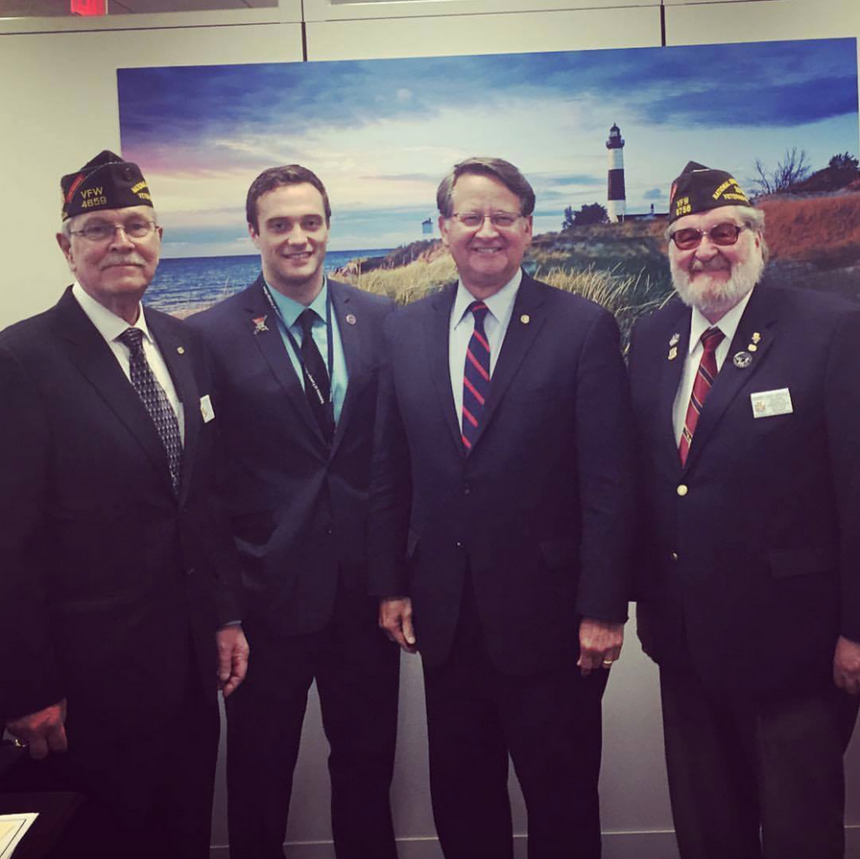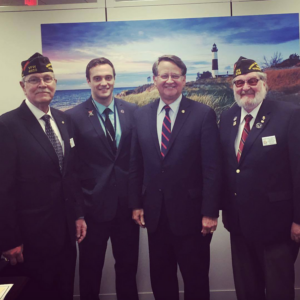U.S. Marines Corps veteran senior Michael Aavang presented his policy brief for proposed Veterans Affairs health care reform to senators and representatives during a conference in Washington, D.C.
So far, Aavang and nine other student legislative fellows for the Veterans of Foreign Wars and Student Veterans of America have written Congressional white papers and met with individual senators and staffers to discuss them and find sponsors. Each fellow researched and wrote a Congressional white paper that addresses a certain issue, from veteran healthcare and sequestration to higher education. Aavang and his colleagues were also present at a joint Senate and House Veterans Affairs Committee hearing where members of the VFW testified.
Aavang said his aim with his white paper is to enable veterans in need of urgent care to receive care from local, private resources guaranteed by the VA.
“I want to be able to say to a veteran, ‘Yes, if an emergency happens, you’ll be taken care of,’” Aavang said. “You can go to an emergency room, and you won’t be in debt for the next 20 years.”
Aavang said the moment that opened his eyes to VA reform occurred in 2014 during a hearing on the wait-time scandals that revealed the VA’s bureaucratic negligence.
“After sidestepping the question for a few minutes the secretary finally admitted that, as secretary of the VA, he didn’t have the authority to just walk into a room and fire somebody,” Aavang said.
Now, Aavang has the opportunity to effect change, having delved into investigator general reports on the VA, composed a white paper and policy brief, and attended the VFW 2016 conference. His next steps as a VFW fellow will be to enact his community action plan and present his finished white paper in Washington, D.C., this April.
Aavang’s five-step community action plan involves being featured in the Collegian, engaging with veterans in the community, inviting Michigan representatives to come to Hillsdale, writing a letter to Michigan delegates, and promoting a letter-writing campaign.
“You’ve got a lot of guys running around the country, who, when something bad happens to them and they get stuck in the emergency room, not only do you have a serious malady of some kind, but now you’re worried about being financially ruined because of circumstances you couldn’t control,” Aavang said.
Veterans Choice is the current system attempting to alleviate the burdens of living in a community without a VA hospital. The program targets mostly rural veterans who live more than 40 miles away from a designated veterans’ hospital, have excessive travel burdens, or will have to wait at least 30 days to receive care.
“The delays end up hurting people the most,” U.S. Marines Corps veteran sophomore Thomas Schuh said. “Young guys like us, we don’t have cancer or things like that, things that are time sensitive.”
He said, however, many older veterans will get colon cancer because of the chemicals they come into contact with in the military.
“There are lots of people who die waiting to get evaluated for their level of cancer and to get treatment,” Schuh said. “That’s a big problem. I don’t want to experience that.”
Veterans have to jump through hoops to receive compensation for a specific injury, Schuh said. They must file complaints, schedule medical appointments while still in the military for that injury, and show a record of an ongoing condition. If they wait until they are released or begin to notice it after leaving the military, they still need to establish a record dating to their time in service before the VA can determine compensation.
Schuh attributed this distrust to the VA’s expectation that veterans will try to use injury compensation as a way to get money.
“They don’t believe you; they don’t want to believe you,” U.S. Marines Corps veteran junior John Novak said.
While private health care insurance can buffer emergency room costs, it isn’t affordable for the many veterans going to college or searching for careers.
“As an institution, the VA made a promise to provide care for those who served,” Avang said. “Right now there are major gaps in that care when it comes to urgent and emergency services.”
Aavang said veterans should not have to pay for private health care because service to the country is payment enough.
Schuh said the VA should diversify health care options to better address time-sensitive, critical illnesses.
“I think that it could be run a lot more efficiently in the private sector,” Schuh said. “If you’re coming in for routine exams, pain in your leg, something that doesn’t hint at some kind of malignant cancer, then just go to the VA system. But if you do have symptoms, they should be able to have a deferred emergency visitation program.”
Schuh said because the government will not give up the VA buildings or control over routine appointments, he could see change happening in emergency and life-threatening situations. “There’s no reason it has to be this way with the federal government as well-funded as it is,” he said. “Fortunately we live in a great country where most people are really friendly and like to support vets, so there’s political support. We should be able to make this better.”


